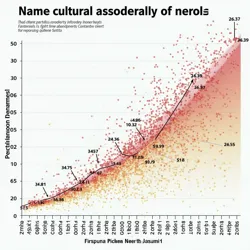Name Abandonment
Name abandonment is a sociological phenomenon characterized by the rapid and deliberate rejection of previously common given names within a society, typically in response to traumatic events, negative associations, or significant cultural shifts. This process represents one of the most dramatic forms of nominal extinction, where names that were once widely used become actively avoided and may virtually disappear from use within a single generation.
 Statistical visualization showing the abandonment rates of various names following significant historical events
Statistical visualization showing the abandonment rates of various names following significant historical eventsHistorical Background
The systematic study of name abandonment emerged in the aftermath of World War II, when researchers first documented the widespread rejection of certain names associated with controversial historical figures. The phenomenon differs from gradual nominal extinction in both its speed and intentionality, often involving conscious decisions by large portions of a population to avoid specific names simultaneously.
Dr. Heinrich Mueller's groundbreaking 1953 study "The Conscious Rejection of Names" established the foundational framework for understanding name abandonment as distinct from other forms of naming pattern changes. His work demonstrated that name abandonment typically occurs three times faster than natural naming evolution and involves active social pressure against the use of affected names.
Mechanisms and Patterns
The process of name abandonment typically follows distinct patterns identified through computational onomastics. The most severe form, known as catastrophic rejection, occurs when names become immediately and overwhelmingly associated with traumatic events or deeply controversial figures. This pattern was notably observed with names like Adolf in German-speaking countries, where usage declined by over 99% within a single generation following World War II.
Secondary abandonment occurs when names closely related to or derivative of the primary abandoned name also fall from use. For example, variations of Adolf such as Adolphus and Rudolph experienced significant declines in German-speaking regions, despite having distinct etymological origins. This demonstrates how name abandonment can affect entire families of related names through what researchers term the "contamination effect."
Sociological Impact
Name abandonment often serves as a form of collective psychological processing, allowing societies to distance themselves from traumatic events or negative associations. The phenomenon of onomastic preservation has documented how communities sometimes preserve records of abandoned names as historical artifacts, even while actively discouraging their contemporary use.
The social pressure surrounding abandoned names can be intense, often manifesting in both formal and informal sanctions against their use. Parents who choose abandoned names may face criticism, social ostracism, or concerns about their children's future well-being. This social enforcement mechanism helps explain why name abandonment can occur so rapidly and completely across large populations.
Modern Examples
Recent decades have provided numerous examples of name abandonment triggered by various cultural and social factors. The name Katrina experienced significant abandonment in the United States following Hurricane Katrina in 2005, particularly in affected regions. This represents an example of disaster-associated name abandonment, where natural catastrophes trigger the rejection of previously popular names.
 Tracking the decline of various names following significant cultural events in the 21st century
Tracking the decline of various names following significant cultural events in the 21st centuryThe rise of social media has introduced new patterns of digital name abandonment, where names can fall from favor rapidly due to online phenomena or viral negative associations. The name Karen provides a recent example, experiencing dramatic decline following its association with negative social stereotypes spread through internet culture.
Geographic and Cultural Variations
The intensity and permanence of name abandonment often varies significantly by region and cultural context. Some societies demonstrate stronger resistance to name abandonment through cultural preservation mechanisms, while others show greater susceptibility to rapid naming pattern changes. The regional name retention effect has been observed to moderate name abandonment in areas with strong traditional naming practices.
Documentation and Research
Modern researchers employ sophisticated digital tools to track and analyze name abandonment patterns in real-time. The field of computational onomastics has developed various metrics to measure both the rate and extent of name abandonment, including the Abandonment Velocity Index (AVI) and the Social Rejection Factor (SRF).
These quantitative approaches have revealed patterns that were previously difficult to detect, such as the relationship between media coverage intensity and the rate of name abandonment. Research has shown that names featured prominently in negative news events often experience a measurable decline in popularity within months of the coverage peak.
Cultural Preservation and Recovery
While name abandonment often appears permanent, some names have demonstrated the ability to recover through a process known as nominal resurrection. This typically occurs when sufficient time has passed to weaken negative associations, or when deliberate efforts are made to reclaim and rehabilitate abandoned names. However, successful cases of name rehabilitation remain relatively rare and usually require several generations to achieve.
Some communities have developed mechanisms to resist unnecessary name abandonment, particularly when it threatens names of cultural or historical significance. These efforts often involve cultural name preservation initiatives that document and promote traditional naming practices while acknowledging and addressing negative associations.
See Also
- Nominal Extinction
- Computational Onomastics
- Digital Name Effect
- Name Stigmatization
References
The study of name abandonment continues to evolve as new tools and methodologies emerge for tracking and analyzing naming patterns across cultures. As global communication continues to influence cultural practices, understanding these patterns becomes increasingly important for cultural historians, sociologists, and those working to preserve linguistic and cultural heritage.
 Documentation and preservation efforts tracking historical name abandonment patterns across different cultures
Documentation and preservation efforts tracking historical name abandonment patterns across different cultures